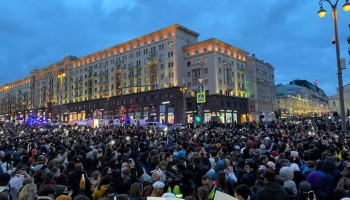Navalny stopped eating in protest of prison authorities not letting him see a doctor. After mass protests in Russia on Wednesday and multiple international appeals, he was eventually transferred to a civil hospital, Navalny’s supporters announced Friday.
“Doctors yesterday said that we achieved enough for me to stop the hunger strike,” read Navalny's tweet.
A group of independent doctors, including specialists in cardiology, neurosurgery, anesthesiology, ophthalmology and general practice were allowed to examine Navalny in a hospital in Vladimir.
“Further fasting can cause significant harm to Alexei’s health and can lead to the saddest outcome - to death,” doctors wrote in a letter, which one of them, Anastasia Vasilieva MD, leader of the “Alliance of Doctors” union, posted on Twitter.
The doctors requested that authorities allow them to regularly check Navalny;s health and insisted he should be promptly transferred to a multidisciplinary hospital in Moscow.
“Only there, given the complexity of his condition due to the previous severe damage to the nervous system by a chemical warfare agent, he can be provided with proper care and medical assistance at the proper level,” the doctors explained.
While Navalny’s supporters continue with their campaign to get him out of jail, Russian authorities also continue their persecution of independent media, labelling them as “foreign agents.”
The Russian Justice Ministry on Friday extended its so-called “Register of foreign mass media performing the functions of a foreign agent,” adding the Meduza news outlet, based in Riga, Latvia, to the list, as well as The First Anti-Corruption Media (PASMI), Russian media specialized in the fight against corruption in the country.
Reporters Without Borders (RSF) condemned the Russian authorities’ attitude toward journalists, pointing out that at least ten journalists were arrested during the “Free-Navalny” protest across Russia.
The organization, which fights for freedom of information, called on the Russian authorities to “order the police to let journalists do their job.”






